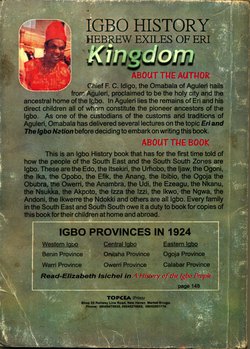Читать книгу Igbo History Hebrew Exiles of Eri - Omabala Aguleri - Страница 8
На сайте Литреса книга снята с продажи.
Speculations On The Origin Of The Igbo
ОглавлениеSome people reaction to the origin of the Igbo can be likened to the reaction of scientists to the origin of man as told in the Bible. The Bible tells us that man was created by God in the garden of Eden, and in continuous sequence, it traces the history of man from when he fell from the grace of God and was driven out of the garden of Eden to when man was reconciled with God through the coming of the Messiah in the person of our Lord Jesus Christ. The Bible story on creation does not consider the factor of time because God lives in eternity and his activities discovered bones of mammal, which have been analyzed and found to exist millions of years ago but, have failed to relate their sources to God’s creation, which took its root from the Garden of Eden. Similarly, our historians, archaeologists, and anthropologists have not succeeded in using scientific methods to prove the origin of the Igbo and do not seem ready to accept any other methods in providing it. Many European writers that made early contacts with Igbo indigenes have used ethnographic materials collected from the indigenes to air their opinions on the history of the Igbo. Europeans like G.T. Basden, and Archdeacon of Onitsha, who spent 35 years working among the Igbo made publications namely: The Igbo Country of Nigeria (1921) and Niger Ibos (1938). Other Europeans published four volumes – (Talbert, 1926) African Women: A Study of The Igbo of Nigeria; (Leith-Ross, 1939), Igbo Village Affairs; (Greed 1947) and The Igbo and Ibibio-speaking People of South-eastern Nigeria.
Besides, there have also been recent publications on the Igbo by Igbo writers. Some of these include Onwuejeogu’s An Igbo Civilization: Nri Kingdom and Hegemony (1981), Elizabeth Isichei’s A history of the Igbo people (1976), and Igbo Worlds (1977), Nzewi’s Star Musicians and Music of the Ese, Ukom and Mgba ensembles of Ngwa, Igbo society (1977), Igbo Minstrels of (Okafor 1980) and Lawrence Emeka’s Vast Broadcasts and writings on “Igbo oral literature and mythology”, including ‘Eri: The Founder of the Igbo Nation (1989: 41-43), and Moons over Anambra i.e. The Study of Igbo seasonal ceremonies. Other pioneers in Igbo studies include Professors Anene, Dike, Echezona, Achebe, Ejiofor, Afigbo, Nwoga, Egudu and IIogu. Also included are Arinze, Eeanya, Ogbalu, Emenanjo and Arazu.
With the exception of Lawrence Emeka, most of these writers operated outside the towns along the Anambra River Basin from which it could have been possible to get prime information on the origin of the Igbo. Most writers mentioned above depended on limited information around their areas of operation. They also depended on archeological discoveries, which did not go any length in finding the origins of the Igbo. Some of them relied on mythology, but unfortunately, no credible history of a people is based on mythology. In order to complement the effects of archeologists and anthropologists, the Igbo have to acknowledge the important role of oral tradition which is known to distort the bits and pieces of information but retain the main ingredients of the history of a people.
